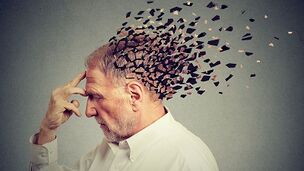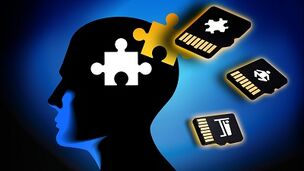
There are conflicting opinions about memory enhancers. Some say that it is helpful and helps to cope with increased intellectual stress, that it is actually helpful and effective.
Others say this is just a myth, that there is no benefit in taking these drugs, even if it can be harmful and addictive for these drugs. Try looking at both points of view in more detail and find out who is right.
A bit of memory
Memory is a mental function of higher nerve activity, with the help of accumulating, storing and recreating previously received information. Memory allows you to store information about the outside world or your body's response to any impact, and it also allows you to use this information to accurately organize activities. Future.
Memory consists of a number of different but related processes.
- Memo- enter new, sensation data.
- Archives- accumulate data, sensations, including processing and assimilating them. This process allows a person to learn and develop his or her thinking and words.
- Copying and recording- realizing past elements, actions, feelings. Reproduction is involuntary (the elements "float" in one's mind without their will and effort) and arbitrary.
- Forget- loss of ability to reproduce and recognize elements that were previously memorized. It can be temporary or permanent. There is incomplete forgetting, when information is reproduced or identified with partial or partial errors.
Basic Memory Types
There are many types and subtypes in the memory classification. Let's talk about its main types.
- Sensory Memory- retains information from the senses after stimulating them.
- Tactile memory- holds information from the receptors of touch.
- Engine memory- stores information about movements, many people may remember that there are movements that they perform automatically.
- Semantic memory- stores information about facts, eg, stories learned, dates, times tables.
- Short term memory- saves information in a short time. There is a small volume.
- Long-term memory- stores information indefinitely, including life.
The Law of Memory

Few people know that there are certain laws of memory. These are not an author's invention, but real life stereotypes that are scientifically established and proven.
- The Law of Repetition- information is much better remembered if it is repeated more than once.
- Law of interest- if a person is interested in information he will remember it faster and better.
- The Law of the Edge- information given at the beginning and end is best remembered.
- The Law of Understanding- if information is well understood, it will be better remembered.
- The Law of Optimal Row Length- the amount of memo should not exceed the amount of short-term memory.
- Installation Rules- someone who has set himself up that he needs to remember this or that information, will remember it faster and better.
- The Law of Inhibition- when remembering similar concepts, old information "overlaps" new information.
- The Law of Context- when it comes to memorizing things that may be associated with familiar concepts, it is faster.
- Law of Action- if memos are used in practice, then memorizing is more efficient and quicker.
These rules can be used if you want to remember something faster and better, as well as to train your memory.
The reason for memory loss
- Organic brain damage- acute cerebral circulation disorder, traumatic brain injury, brain tumor.
- Diseases of other organs and systems- diseases of the liver, cardiovascular system.
- External factors- bad ecosystems, drastic changes in surrounding conditions, stress, sleep disturbances.
- Age-related changes in brain structure- reduces the number of connections between nerves.
- Chronic poisoning- smoking, drug use, substance abuse, alcoholism, drug abuse (sedatives, sedatives).
Treatment of memory disorders
The drug is not prescribed immediately if memory improvement is needed. They first tried to use non-pharmacological methods. These include:
- Take a brisk walk in the fresh air. This increases the brain's ability to access oxygen. This improves his work efficiency.
- Normalizing sleepand alertness.
- Night training- the habit of remembering all the events of the day in reverse order, that is, first of all, recalling what happened at night and last- morning events, can become an unusual way of training. It is better to do this before going to bed, lying in bed.
- Positive attitude, don't take this seriously- don't think you have a bad memory, no one cancels the effects of self-hypnosis. If at any time you cannot remember something, don't worry, don't get angry but just neglect, do something else, and then try to remember what you forgot.
- Daily Training- crossword solving, quizzes, codes.
- Education- learn poetry, foreign languages, work regularly, gradually increase the amount of materials learned.
Medicine for dementia

Obviously learning poetry, foreign languages, solving puzzles is not easy, you have to be "stressed out", walking and solving puzzles should be given extra time, something a real commuterPractical not available.
It will be much easier to take a pill, stay calm and hope for the magical power of the drug - immediately your memory will improve and you won't have to do anything! Modern city dwellers are so lazy and spoiled by the results of their civilization that very few now have a purpose and want to spend their time and energy on memory training. So a person is looking for an answer to his question - what pills for memory improvement exist?
So let's take a look at two opposing opinions on this matter:
Positive comments
Proponents of the use of these funds say that some drugs improve the blood supply to brain cells, thereby improving nutrition and providing more oxygen, helping to improve processes. metabolism in nerve cells.
Nootropics and drugs that improve the rheological properties of the blood help in this.
Herbal preparations have become popular, not only improving the metabolism in nerve cells, but also enhancing the effects of nootropic drugs.
But it should be remembered that any drug (absolutely any) has its own contraindications and side effects, so it should only be prescribed by a doctor in specific clinical cases.
Negative comments
According to some experts, this coin also has a reverse side. A few years ago, experts were puzzled by the question - are these drugs effective or are they just a placebo effect?
According to the results of many studies, the effectiveness of nootropics has yet to be proven. There is no evidence that they have any beneficial effects on memory. One of the small efficacy studies has shown that they have little effect, but not in extreme cases.
Traditional methods and herbal preparations such as ginseng, vitamin E, practically no studies have yet been done. Evidence basis for the use of herbal medicines in patients with dementia. But there are no data on the effectiveness of its use in relatively healthy people.
To conclude, I want to say that when thinking about which drugs to improve memory are best, don't forget that they should be prescribed by a doctor. And the doctor should also evaluate the effectiveness in each case. Don't rely on advice from friends, neighbors or relatives.If you think your memory has deteriorated, see a psychiatrist. Maybe this is not a problem at all, attention can be disturbed, there may be some other problem. Also need to find out the cause of this condition. And this can only be done by a qualified physician.







































































